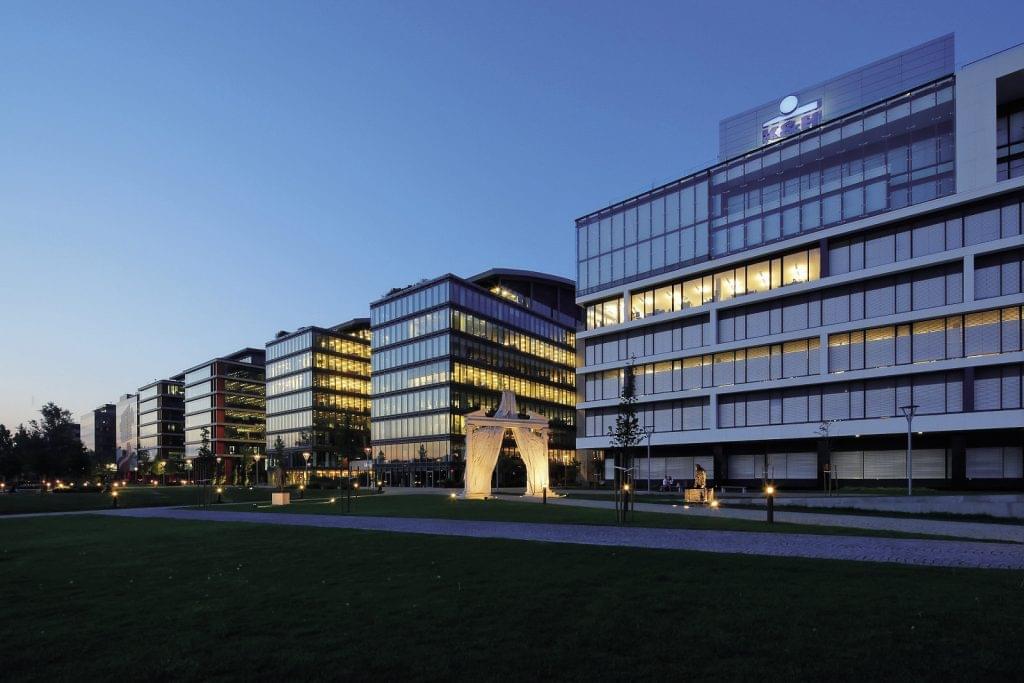Magazine: Hungary’s commercial real estate market keeps growing
After the decline caused by the economic recession of 2008, the Hungarian commercial real estate market was going through a recovery process in the last few years. Zoltán Szalóky, head of tenant representation with Jones Lang LaSalle Kft. (JLL) opines that market trends are shaped mainly by the base rate cutting cycle of the central bank, the positive international opinion on Hungarian economic processes and political stability. Roland Kis, head of industrial real estate rental at JLL added that the Hungarian commercial real estate market is characterised by a good mood and a positive approach. Tamás Steinfeld, associate director of Colliers International’s valuation and advisory services, and market research director, told our magazine that both tenants and investors are most interested in the office, industrial and retail markets – the hotel segment recovered more slowly.

Adorján Salamon, CEO of ESTON International estimates that the value of real estate investment will be a record high of EUR 1 billion. More than 100,000m² of new offices will find their new owners. ESTON’s experience is that due to the fact that little new office space was built in the last few years, now that demand has increased, free office space is rented out very fast. The same is true for industrial/logistic buildings. Mr Salamon thinks that because of these reasons a rental fee increase is inevitable. In Budapest the total area of office space available is approximately 3.3 million square metres (the second largest office floor space after Warsaw). In the last 1-2 years, thanks mainly to regional shared services centres (SSC) settling in Hungary, demand for offices tended to exceed supply.
Mr Szalóky explained that supply is now trying to catch up with demand – new offices of the current wave of development will appear in the market in 2017-2018 and later. The CEO of ESTON International informed that in the office rental market a record low of empty office space was measured in the middle of 2016: only 10.3 percent of offices were unutilised; the proportion of unused industrial buildings was also low at 9.7 percent. According to Budapest Research Forum (BRF) data from the third quarter, the utilisation rate of Budapest offices is 10.9 percent at the moment, a little more than in the previous quarter. As a matter of fact, in the last 3 years this was the first quarter when there was an increase.
Colliers International’s expert added that latest data on the industrial/logistic market indicate that the proportion of empty buildings kept decreasing in the logistic segment in Budapest, reaching 8.9 percent in the third quarter. At the moment the type of real estate use very much depends on the company’s profile and finances. In the office market rental is more frequent and the same is true for modern logistic buildings. Mr Salamon informed that in the last few years they experienced growth in buying industrial/warehouse buildings for own use. Retailers still tend to rent shops instead of selling goods from their own property. Mr Steinfeld is of the opinion that with modern office and logistic buildings companies prefer rental – this is well indicated by the fact that only 20 percent of the 3.3 million square metre of modern Budapest office space is utilised by owners. The experts of Colliers International told that in the last few years Budapest was the centre of Hungary’s commercial real estate market, in terms of both buying and rental.
Interest was the biggest in real estate located close to the city, places that can be approached using public transportation. In the logistic real estate market the most preferred locations are those close to the M0 motorway ring road, and the cities of Székesfehérvár and Tatabánya. From an industrial/production point of view Győr and Kecskemét are popular locations as well, mainly for investors from the automotive industry. JLL reported that in the office space market the Váci Road corridor, South Buda and South Pest are popular. Environmental protection and using renewable sources of energy are trendy in the real estate market as well. This isn’t a marketing trick as operating costs can be reduced and it is easier to find tenants in pleasant, ‘green’ and ergonomic buildings. What is more, today the offices a company uses form part of the corporate image.
In the first half of 2016 Hungarian-owned investors generated 40 percent of the total volume of transactions in the commercial real estate market. They were followed by US-owned investors with a 37-percent share, while the share of Europe-based investors was only 23 percent. Mr Steinfeld added that in the first half of the year Hungarian investors spent more than twice as much money on buying real estate than in the same period of 2015. Roland Kis’ view is that German and US investors are the most active when it comes to buying industrial real estate in Hungary. JLL has been present in the Hungarian real estate market since 1992 and it is one of the biggest real estate counselling groups, which has a US background. They are active in practically every segment of the commercial real estate market and the company is market leader in certain fields such as investment counselling or tenant representation.
JLL offers complex real estate counselling services to companies, customised to the partner’s needs. Eston International celebrates its 23rd birthday in 2016. Since 2012 the company has also been offering integrated facility management services. ESTON’s mission is to offer partners an optimal real estate solution and to turn real estate into real value. ESTON is the only fully Hungarian-owned company that managed to retain its strong market position. Customers appreciate the company’s reliability, flexibility and the fact that they offer tailor-made solutions. Colliers International has 554 offices in 66 countries – the company is one of the biggest real estate services company in the world. Their main profile is counselling related to the rental and selling of commercial real estate, but they also do facility management counselling and offer services related to making office buildings more ergonomic and environmentally conscious. Top-level advisory service is their main objective and thanks to their worldwide network of experts, they can satisfy customer needs at the highest level
Related news
Related news
The Christmas season is starting earlier and earlier: value for money is the key
This year, 40 percent of Hungarians brought their Christmas shopping…
Read more >They want it to be premium, but also sustainable – expectations of the youngest generation
GlobalData’s latest report, “Demographics in Retail and Apparel” – which…
Read more >In six months, consumers donated 100 million forints to charitable causes through the mandatory redemption system
Through the deposit bottle return system, which began six months…
Read more >




